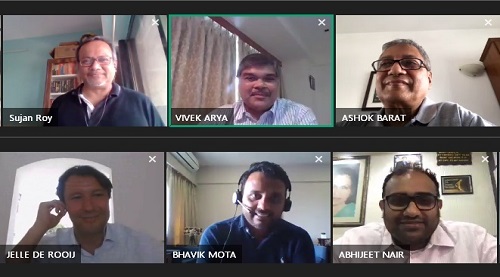A webinar on ‘Impact of Covid-19 on Logistics & Shipping Industry & Way Forward’ was organized by The Council of EU Chambers of Commerce on 25th June 2020.

Panelists were Mr. Vivek Arya, Managing Director, Rhenus Logistics India (P) Limited, Mr. Bhavik Mota, Director Head of Products South Asia, Maersk, Mr. Sujan Roy Head of International Business for Passenger Vehicles, Tata Motors Ltd., Mr. Jelle di Rooij, Sr. Manager Supply Chain Solutions, Holland International Distribution Council while the moderator was Mr. Abhijeet Nair, CEO FEI Cargo.
Mr. Ashok Barat, President of EU Chambers made the opening remarks by thanking all the panelists and introducing EU Chambers to the audience which has a very specific purpose of promoting bi-lateral business relations between India and countries of EU and Chambers’ rich history. He also explained why this topic was chosen as Shipping is an unique industry as whenever a crisis occurs first one to be hit is supply chain and therefore shipping and logistics industry are hit and with this incident it was particularly bad as along with goods even movement of people is halted however he was optimist about how this industry will see most massive turn around and a disruptive change in which it is carried out.
As the panel discussion started following introduction of all panelists, Mr. Arya said how there was chaos amongst people as lockdown was announced but there was emergence of digitization. There was also a mismatch from service taker and service provider side and it lead to stressing of supply chains and how in last few months we have seen de-globalization or re-nationalization. He said he foresees in times ahead a lot of consolidation happening in logistics sector and these are the times for collaborative logistics in the interest of service taker.
Mr. Roy said we see in the places where lockdown restrictions have been relieved where impact of virus is lower, demand is seeing a bounce back, surprisingly in India we are seeing demand is growing much stronger as compared to what we had foreseen. Unfortunately restarting complex procedure of manufacturing an automobile which needs work and coordination of around 3000 people, we haven’t been able to supply vehicles in the quantities which we would have been able to provide for which the demand exists for our automotive sector and sectors as well which depend on Shipping and Logistic industry. Good news is that terror with which we started with has not materialized and impact has been rater mild and as when government will announce normalcy, people will go back to the old ways of
consumption at a faster rate.
Mr. Mota talking about the global scenario said how a crisis in China puts entire world to risk as every single company who is global in nature has heavily invested in and by China in some form. He stated how IMF and World Bank have predicted a 5%drop in global economy while the impact on world trade will be 15% to 20%, so a new normal will see a slump of 20%. Chemical right now is the fastest moving product as it is needed for manufacturing of PPE kits, masks etc. but auto, retail and luxury segment of lifestyle sector are beaten and will take a long time to bounce back nobody knows how long it will take to recover. There is going to be acceleration of regional supply-flows as we see with US-China trade war, India-China sentiments right now, Brexit etc. but also environment changes and greater digitization which will reduce information asymmetry which we have in transportation right now.
Mr. Rooij said how street shopping saw a reduce, while e-commerce gained as many people started buying online, so supply chains will have to be redesigned in a much sustainable way to keep up with the increasing demand from eCommerce. He stated how there will be deglobalisation or different form of globalization, which will reduce dependence on one supplier in China or elsewhere. He also mentioned how digitization means less human interface, robotisation and we might see more use of robots in warehouses and lastly data how you can share it with your peers and work better and take better decisions. Panel discussion was followed by Q&A round followed by vote of thanks.
